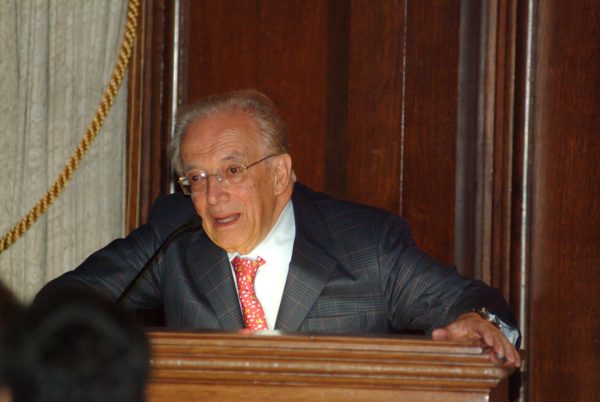About Professor Friedrich Katz
Friedrich Katz is recognized as the foremost scholar of Mexican history of his time. A professor of history at the University of Chicago for four decades, Katz may be best known for his magisterial account of the Mexican Revolution, which brought Mexican history out of the realm of legend and onto the worldstage of great revolutions and modern social upheavals.

Friedrich Katz was born in Vienna in 1927. His father’s work as a journalist soon took the family to Berlin, where he joined the resistance when Hitler came to power, eventually fleeing to France to escape arrest. From Paris, Katz’s father, posing as a wealthy businessman, smuggled arms to the Spanish Republic. The family was once more forced to flee in 1938, finding temporary asylum in the United States, and eventually settling in Mexico in 1941. For the rest of his life, Katz felt deeply grateful to Mexico, which granted his family asylum, under a policy that welcomed those who had assisted the Spanish Republican cause and were forced to seek refuge abroad. Friedrich Katz’s lifelong passion for Mexican culture was thus ignited from the accidents of geo-political upheaval; the linking of Mexican history to world events became central to his life’s work.
Educated in Mexico and the United States, Katz earned his doctorate at the University of Vienna. It was in Vienna that he met his wife of 54 years, Jana Badian Katz, who became a pediatrician. His thesis on Aztec society, Socio-economic relations of the Aztecs in the 15th and 16th centuries, broke new ground by placing the available anthropological andarcheological research on Aztec civilization in a historical context, asking fundamental questions about the evolution of Aztec society by comparing it with other ancient or pre-modern societies. His subsequent book, The Ancient American Civilizations, first published in German in 1969, remains in print in several languages and is still a canonical work in the field.
Joining the faculty at Humboldt University in East Berlin in 1956, Katz discovered archives revealing Mexico’s ambivalent role in European diplomatic history before and during World War I. The research led to Katz’s study, The Secret War in Mexico: Europe, the United States, and the Mexican Revolution, published in 1981. This ground-breaking work of scholarship examined the external forcesat play during the Mexican Revolution, and situated the Revolution on the world stage, making this event intelligible to historians of other great social upheavals of the modern world.
In 1968, after the Soviet crushing of the Czech rebellion, Katz left Germany for a guest professorship at the University of Texas. In 1971 he was invited to teach at the University of Chicago. Under his leadership, Chicago became the leading center for Mexican historical studies in the United States.
In 2000, Katz published The Life and Times of Pancho Villa, in which he unearthed the complexity of the character of Pancho Villa and his movement, bearing notable contrast to the legends and myths that had previously reduced Villa and his followers to mere caricatures. In Villa’s character he identified a tension between the moral necessity of agrarian and other popular reforms and the practical imperatives of military campaigns and stable government, which made him emblematic of contradictions in the Mexican Revolution as well as post-revolutionary Mexican society. Called a “masterpiece of contemporary historiography” by the Mexican novelist Carlos Fuentes, The Life and Times of Pancho Villa, won the Beveridge and Bolton book awards in Latin American history.
John Coatsworth, Dean of the Columbia University School of International and Public Affairs and a long-time colleague of Katz’s at the University of Chicago, said that “Katz’s work, more than that of any other historian succeeded for the first time in inserting Mexico’s revolution into global historiography.”
But Katz’s appeal transcended that of an academic historian. His renown in Mexico was such that Professor Mauricio Tenorio of the University of Chicago described him as “respected and beloved throughout Mexico, by presidents, ex-presidents, colleagues, peasants in Chihuahua and high school students,” who flocked to his seminars in Mexico by the hundreds.
In recognition for his work, in 1988 Katz received the Order of the Aztec Eagle, the highest honor that Mexico can bestow on a citizen of another country. In 2004, Mexican president Vicente Fox inaugurated the Katz Center for Mexican Studies at the University of Chicago.
Katz died of cancer on October 16, 2010, at age 83.
On October 18, two days after his death, the Mexican government announced the establishment of the CÁTEDRA CONACULTA-KATZ to support visiting Mexican scholars and creative artists at the University of Chicago.
Professor Katz’s family has asked that all gifts in Professor Katz’s memory be made directly to the Katz Center for Mexican Studies. To make a contribution, please click here.